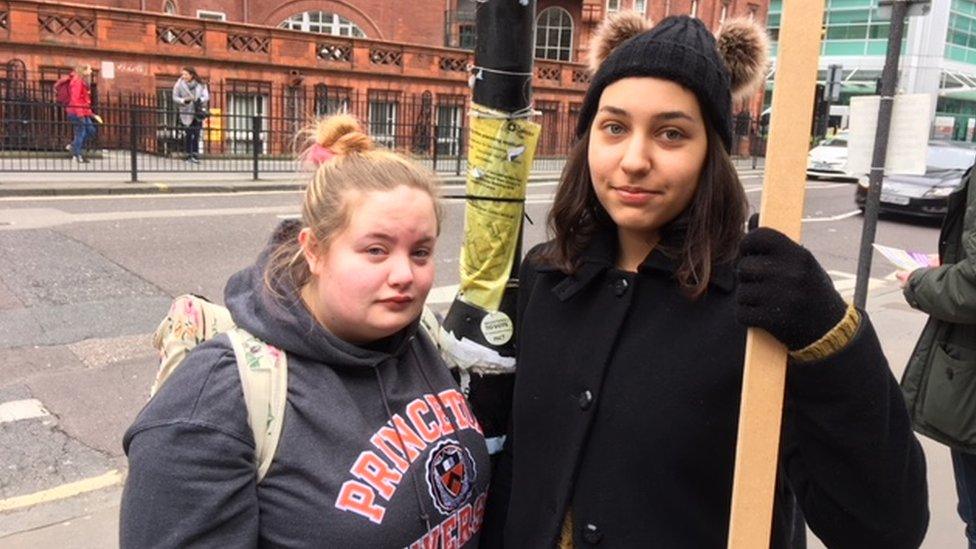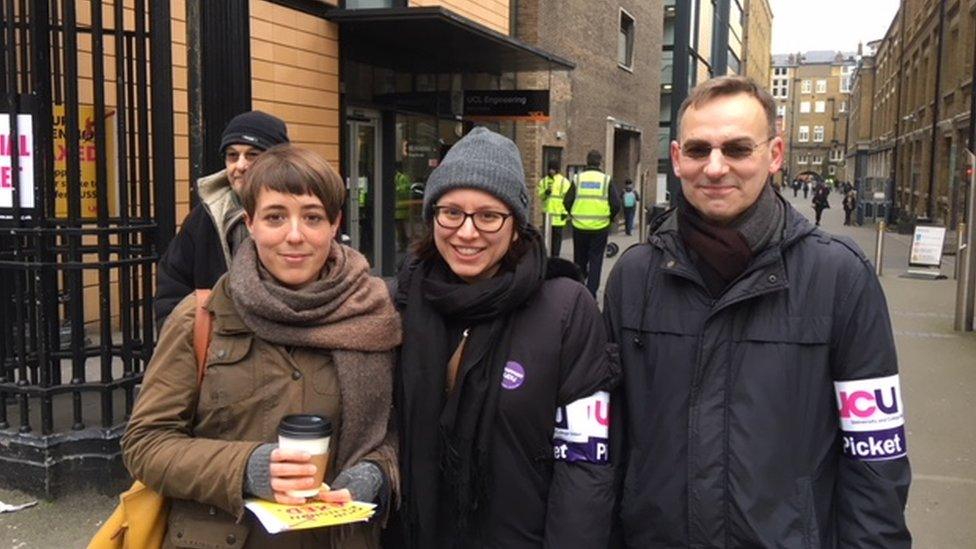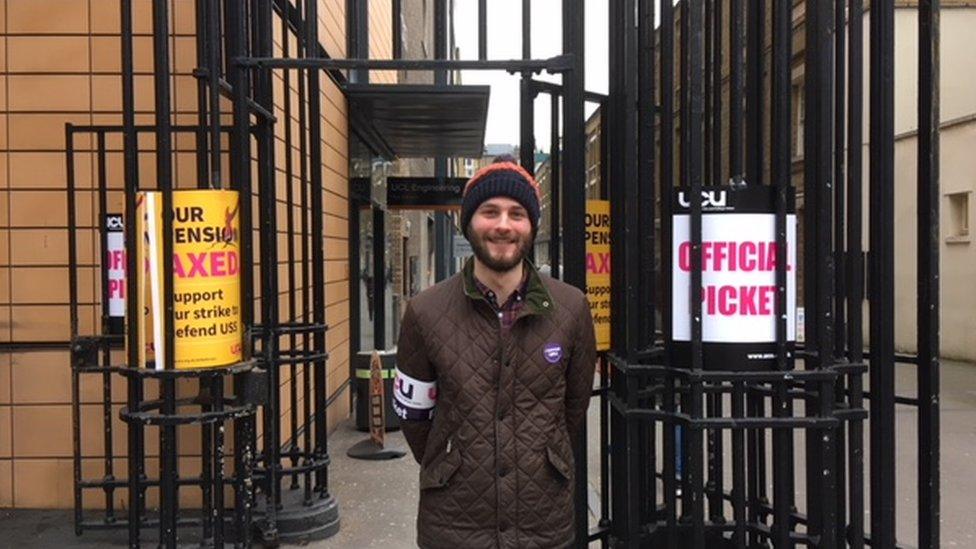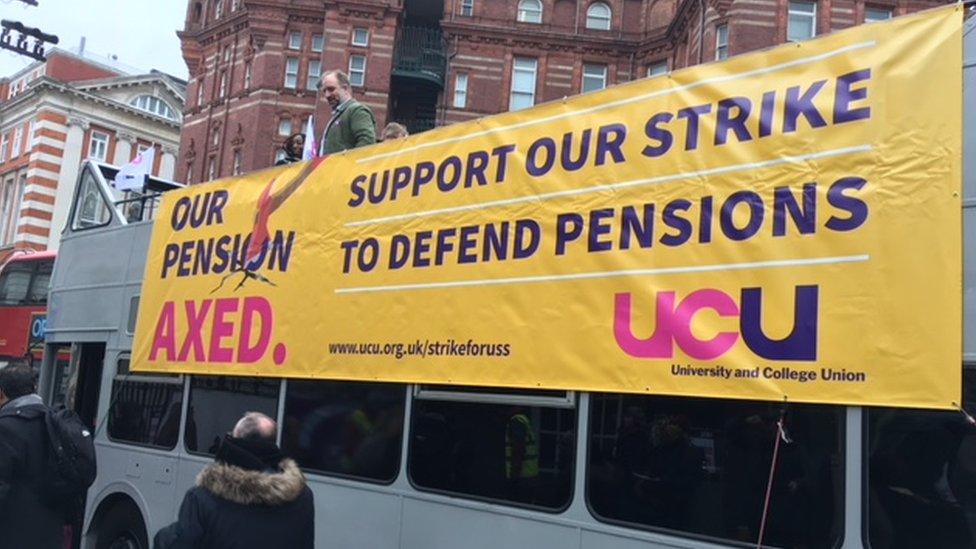Emotions run high on university pickets
- Published

Ashley Hayward stands anxiously on the picket line outside the Senate House library in the heart of Bloomsbury, central London.
As cries of: "Don't go to your classes today, don't cross the picket," ring out, the stress tells on the 19-year-old's face.
Edging forward, the first-year ancient-languages student seems distressed and a little angry.
"I completely agree with the lecturers, but I am paying for my education and my teacher is running the lesson today," she says.
"This is my degree. I have an exam. So I can't miss it."
"This is an exam that is 50% of a core module."
Polite-but-persuasive picket Martha, a full-time researcher in neuroscience, tells Ashley: "We are asking students not to go in today. This is about our pensions.
"Can I tell you what I am giving up to be here? I have cells in the laboratory that I need to work on. We all have things that we need to do."
If the strike has a big impact in its early days, Martha says, the University and College Union hopes the employers will come to the negotiation table sooner.
'Marked down?'
But Ashley replies: "As far as I know, everyone is going in. Everyone is just really stressed about the test."

Eventually, the dilemma proves too much for the teenager and she bursts into tears.
Ashley is comforted by her friend and housemate Dora Dimitrova, 18, who is part of the picket and holds a UCU banner in support of the strike.
But Ashley tells Dora: "I am already struggling to keep up. If I don't go to the exam, I wouldn't get a mark at all. And then I might have to do the whole thing again."
Seeing the teenager in distress, Martha tries to reassure.
"I'm sorry this so stressful," she says, clearly concerned that Ashley is upset.
"I can't tell you what to do, but it's not fair for students to be academically punished for not attending today."
'Wider struggle'
Another academic, from a neighbouring drama school, which is also part of the strike, comes in to offer some comfort.
She says: "I can't advise you because you're not my student, but we have told our students they won't be penalised for not turning up.
"If you don't go - you wont be penalised, because it's not your fault.
"And you can appeal, and the students' union will back you."

But this does not seem to resolve the issue for Ashley, who is clearly still worried about how the strike will affect her degree.
For Dora, a first-year student in European social and political studies, the strike is about much more than just academics' pensions and missing classes.
"I think that education should be free," she says. "The marketisation of education that we have been seeing is harmful to academic staff.
"This particular strike is about the pension, but it's important to contextualise it against wider struggles against the marketisation of education."
Many of the academics on the University of London picket lines talk of the short-term contracts that they are on. They don't even qualify for pensions.
'Love my students'
English teaching fellow Nik Gunn, 30, says: "Many younger academics are on contracts where we are not employed over the summer holidays.
"This is all about the increasing casualisation of the workforce in academia."
He adds: "I love my subject and I love the students. I wouldn't work in such an unstable sector as this if I didn't love my subject.

Nik estimates that 35-40% of academic staff are on a casual contract and that this is increasing all the time.
A lab technician speaks of the "virtual zero-hours contracts" some of his colleagues are on.
And Rachele de Felice, who teaches English and linguistics, says short-term contracts mean little continuity of teaching for the students.
For fellow picket Kristen Treen, a Cambridge graduate on a 10-month contract as a teaching fellow, the uncertainty is difficult to deal with.
"You don't have time to just do what you're doing - you spend all the free time looking for other jobs," she says.
Back on the Senate House picket line, another student, who had been keen to get on with her dissertation, has turned back.
She has decided to go and do some work in a cafe instead.